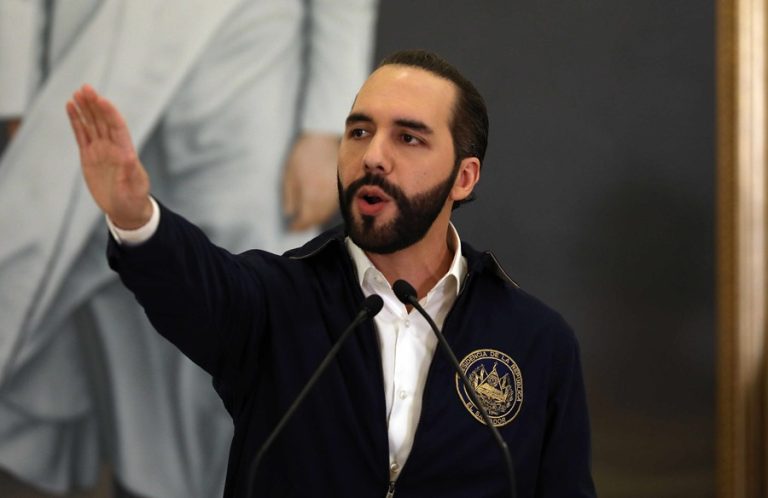14 de julio 2023

Children of Exile: The Births “Sowing Hope” in the Camp of Nicaraguan Farmers

PUBLICIDAD 1M
PUBLICIDAD 4D
PUBLICIDAD 5D
Literature is Salvadoran president Nayib Bukele’s newest enemy. The weight of his censorship has now fallen on young writer Michelle Recinos

Nayib Bukele, President of El Salvador. Photo: EFE/File
Literature is the new enemy of the “State of Exception” declared by Salvadoran President Nayib Bukele. The weight of his censorship has now fallen on young Salvadoran writer Michelle Recinos, whose short story collection Sustancia del higado [“Liver broth”] was scheduled for presentation at the XX Guatemalan International Book Fair, which runs from July 6 – 16. However, the Salvadoran government issued an ultimatum to the Book Fair organizers: either remove the book from the program, or El Salvador would cancel its participation in the gathering. The resulting agreement was a pathetic example of concession on the part of countries that had no interest in registering their disagreement.
You don’t need to go very far to know that President Bukele’s objections aren’t based on questions of style. Barberos en huelga [“Barbers on Strike”], one of the stories in the collection, – which received the 2022 Mario Monteforte Toledo short story award – portrays a fictitious geography called San Carlos, in which a “national state of exception” has just been imposed. Any resemblance to real events isn’t just pure coincidence. The Monteforte Toledo jury’s statement noted that the narrative formulation of “Barbers” is an “original and direct approach to the threat posed by current oppressive regimes.”
The story’s main character runs a mechanic’s shop. Day by day, he notes the changes brought by the State of Exception, in a diary whose 60 entries trace his evolution from indifference to fear.
“I was late to the shop, but everything’s okay,” he notes on the day San Carlos awakens under military rule. There’s no problem, he concedes: the soldiers are doing their work – hunting down bad elements, stamping out delinquency. Such a police apparatus won’t affect him.
“It was 1. I’d seen some soldiers entering the alley. I turned off the light and locked the door. All in all, I’m clean and owe nobody.” That was the night they arrested his neighbor’s son, which doesn’t strike him as right. As the days pass, the list of those captured and automatically converted into missing persons lengthens: the baker, the ticket collector on the bus, the bus driver, his workmates, the barber, the man who delivers propane cylinders… all end up thrown in the meat grinder.
To be detained, you need only sport a stylish haircut – the Mohican style popularized by an illiterate but celebrated beach soccer player (who, to top it off, ends behind bars) – as cause for arrest. In San Carlos, appearance is the key to identifying a criminal. The machinery, once set in motion, can’t be stopped – it feeds on people and is insatiable.
In the prisons, criminals, workers, common citizens, are all thrown together. A gooey lump of humanity. Arrest warrants, judges, lawyers, habeus corpus laws, legal safeguards have all been abolished in San Carlos. Seventeen thousand have been captured in 29 days – a “master play on the part of the President of the Republic,” comments a television anchor. A new hairstyle is imposed on San Carlos: the shaven head
Michelle is a journalist in San Salvador. With an incisive style, she processes what she sees. Her fiction follows reality but moves with enormous speed. Today, the real machinery of the “State of Exception” has premiered a new phase: banned literature.
*The author is a Salvadoran writer and journalist.
This article was originally published in Spanish in Confidencial and translated by Havana Times.
PUBLICIDAD 3M
Escritor y periodista salvadoreño. Su actividad periodística se sitúa principalmente en el diario La Opinión de Los Ángeles, donde ha cubierto migración, educación, economía, transporte, energía y movimiento laboral. Investigó y escribió la crisis inmobiliaria de 2007 y sus secuelas. Es autor de numerosos artículos de opinión. Fue colaborador de la revista Tendencias, de Milenio Diario y Milenio Revista, de México, y columnista de La Prensa Gráfica. Estuvo a cargo de la Dirección de Publicaciones e Impresos entre enero 2012 y abril 2013.
PUBLICIDAD 3D